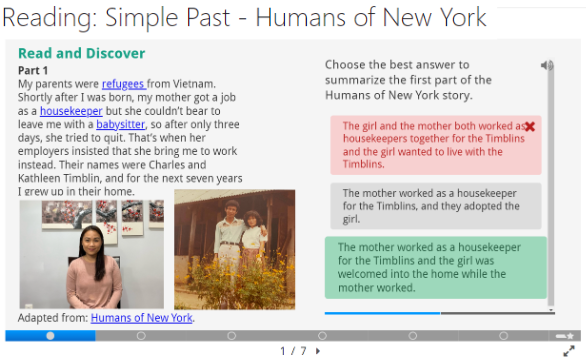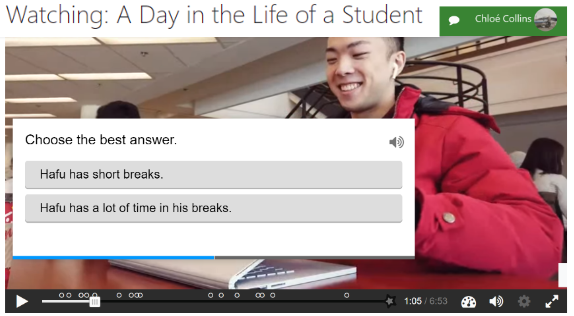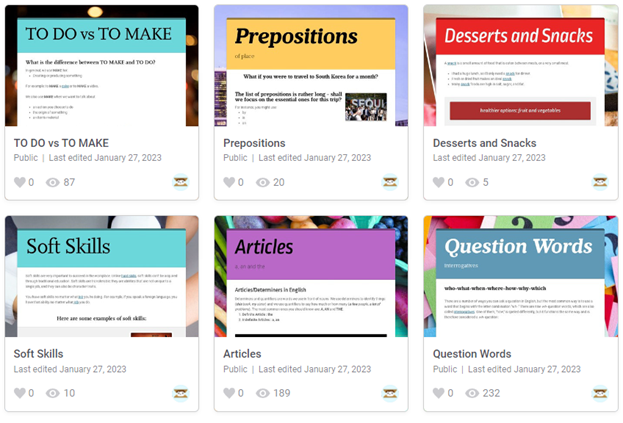Out of a desire to support all students in successfully learning English at the college level, in 2019, our team at Cégep Édouard-Montpetit started working on a Moodle-based Mise à niveau course (604-000-MQ) that allows colleges to offer absolute low-beginner students a springboard to their first required general education English course. After collaboratively designing and testing our course with colleagues from 6 other colleges thanks to an Entente Canada-Québec grant, the platform is now available to the entire network, and as of the winter 2023 session, 23 colleges are already exploring its possibilities or using it. In this article, we explain why this is important in terms of equity and access, and how the platform works.
Addressing an important need
As part of their general education courses, Francophone CEGEP students need to successfully complete 2 English as an Additional Language (EAL) courses, which are called English as a Second Language (ESL) courses in Quebec. Four levels are offered (100-103) and allocated to students after a placement test. However, an important number of students do not feel adequately prepared to pass the lowest-level course Anglais de base (Basic English, 604-100-MQ) because:
- they have experienced difficulties in English during their school career in the Quebec educational system
- the English instruction they received elsewhere has not prepared them adequately for the reality of CEGEP
The ministère de l’Enseignement supérieur (Ministry of Higher Education) [in French] enables colleges to offer a Mise à niveau (MAN) course [a remedial course] based on the competency 01PM Comprendre et exprimer des messages simples en anglais [Understanding and expressing simple messages in English] or 1002 Communiquer en anglais, langue seconde [Communicating in English as a second language]. Financing is available [in French] to offer a remedial course, yet interviews we conducted with college administrators indicate that this possibility isn’t widely known. In order to promote offering remedial English across the college network and support student success in an inclusive and equitable manner, we have designed Anglais précollégial, a free fully-interactive Moodle-based course containing all the materials and activities necessary for colleges to offer 60 hours of remedial English in the format of their choice [testimonials in French]:
- Synchronous
- Asynchronous (mandatory or optional)
- Hybrid (synchronous and asynchronous)
- Help centre workshops or support for tutors working with MAN students
Anglais précollégial allows students to:
- progress at their own pace while having access to the tools to succeed in Basic English
- improve their English without affecting their R-score
- benefit from teacher guidance and support when it is offered in synchronous or hybrid formats
- maintain full-time student status when it is offered as a non-credit course with course units attached
What is Anglais précollégial and how does it work?
Anglais précollégial is a Moodle-based course. It is available free of charge but needs to be integrated into each college’s own Moodle platform [in French]. Our team is available to support you in this step during the winter 2023 session, but the course will still be available even beyond the end of the ECQ grant. Please do not hesitate to contact either of us by email (Chloé and Rebecca) if you would like to receive access to explore the course, or if you would like to implement it locally at your college.
Video presentation of the Anglais précollégial course
The course is designed to help absolute or low beginner students (the equivalent of A0 in the Common European Framework of Reference for Languages) acquire the tools and concepts they need to succeed in Basic English 604-100-MQ. It offers material to address all 4 language skills while initiating them to college life:
- reading

Screenshot of a reading comprehension activity designed with H5P
- listening

Screenshot of a watching activity designed with H5P
- speaking

Screenshot of a Moodle section presenting 4 pronunciation practice activities

Screenshot of a student recording a speaking activity with Flip
- writing

Screenshot of a grammar exercise designed with H5P

Screenshot of a writing exercise designed with H5P
The mini-lessons and activities, enough for over 60 hours of work for students, have been created so that they can be completed asynchronously or with teacher guidance. Students need headphones and a microphone to complete most of the speaking and listening activities. All content is fully customizable so teachers can curate or adapt content to their local needs.
There are 5 fully interactive modules, each developed around specific themes but that recycle vocabulary and grammar for maximal exposure while leading them progressively towards what will be expected in 100-level courses:
- Module 1: Introduction
- Module 2: Cégep and Technology
- Module 3: Food and Home
- Module 4: Work/Life Balance
- Module 5: Where Next?
In order to offer students meaningful and authentic tasks, we leveraged the power of Moodle plugins and outside resources:
- H5P: interactive and gamified content that targets all 4 skills
- Poodll: pronunciation practice
- Flip speaking practice: get students interacting asynchronously with the possibility of teacher feedback
- Smore: mini-tutorials are also available outside of this course to support students if so desired

Screenshot of 6 mini-tutorials designed with Smore
Takeaways
Offering this open-source course helps students acquire English, whether they have been educated in Quebec or elsewhere. The additional pedagogical support also contributes to equity in access to education by ensuring that all students have the skills necessary to obtain a degree.
Since the Service regional d’admission au collégial admits these students without verifying that they have the necessary linguistic and academic skills to succeed at the post-secondary level, namely in the general education disciplines, this potentially sets them up to fail and ultimately be excluded from future employment and higher education opportunities. We encourage all colleges to use what we have created as they see fit, keeping in mind that our Moodle-based Mise à niveau course is free and completely modifiable to meet local needs.

